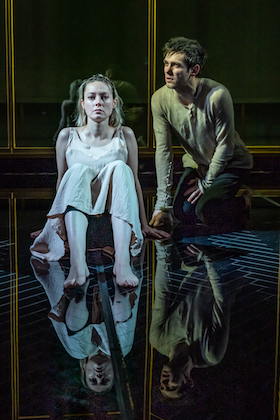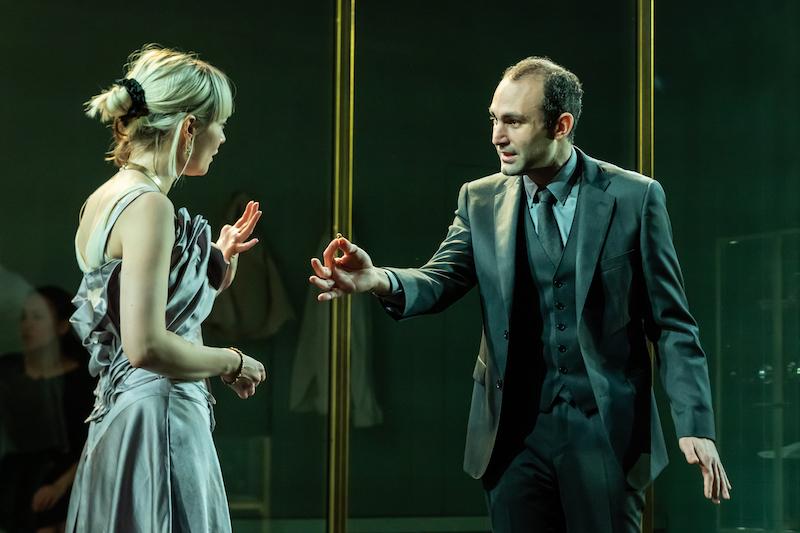This play can be a challenge for modern audiences: a woman who is ostensibly in a position of power, "a prince" in Renaissance terms, is nevertheless constrained by social expectations and a prisoner of the will of her overbearing brothers. A widow, she defies them to marry her steward Antonio in secret and tragedy ensues. The action can seem to move from one set-piece of madness or terror to the next, including scenes of visceral violence, while the onlooker is expected to accept unlikely possibilities such as that the Duchess (who is never named) could have given birth to three children in her palace without revealing the identity of the father.
Rebecca Frecknall attacks the text boldly, judiciously cutting it and placing the action on a set (designed by Chloe Lamford) which consists mainly of a wide glass box. On each side, a glass case holds props and there are minimal suggestions of rooms just "off" to which actors sometimes repair. This could scarcely be more different from the circumstances of the play's first performances, in 1614, at the intimate candle-lit Blackfriars Theatre (although it was later played outdoors at the less rarefied Globe too). There was the opportunity to get some idea what that earliest experience was like in 2014 when Dominic Dromgoole directed Gemma Arterton in the lead role at the Sam Wanamaker Playhouse, making the most of the suggestive power of darkness. Frecknall's intentions are different.
 To begin with, the abstraction which she used to such brilliant effect in Tennessee Williams' Summer and Smoke last year threatens to provide a demonstration of the themes of the play rather than a way into it. A powerful woman, simultaneously on show and imprisoned, the necessary qualities of a leader, the contrast between reality and subterfuge and of the parallels between theatre and the real world - these ideas are brought out clearly. But the emotional intensity found in the Williams is lacking here - it seems deliberately. Scenes are labelled in Brechtian fashion, in lights: "A Birth", "A Trap" etc. And there are a few too many slo-mo moves, for my taste, by actors not directly involved in a scene. Nevertheless, all the characters are allowed a degree of humanity and after the interval and the sign "A Murder" it somehow all pays off, speeding to the horror of the final scene which culminates in the slow piling up of bodies to the heart-stoppingly mournful strains of "Dido's Lament".
To begin with, the abstraction which she used to such brilliant effect in Tennessee Williams' Summer and Smoke last year threatens to provide a demonstration of the themes of the play rather than a way into it. A powerful woman, simultaneously on show and imprisoned, the necessary qualities of a leader, the contrast between reality and subterfuge and of the parallels between theatre and the real world - these ideas are brought out clearly. But the emotional intensity found in the Williams is lacking here - it seems deliberately. Scenes are labelled in Brechtian fashion, in lights: "A Birth", "A Trap" etc. And there are a few too many slo-mo moves, for my taste, by actors not directly involved in a scene. Nevertheless, all the characters are allowed a degree of humanity and after the interval and the sign "A Murder" it somehow all pays off, speeding to the horror of the final scene which culminates in the slow piling up of bodies to the heart-stoppingly mournful strains of "Dido's Lament".
Frecknall's editing removes some of the most difficult elements for a modern audience, including the performing madmen and the death of Julia, the Cardinal's mistress, by poisoned Bible.The Duchess's lack of reference to her children at her death is perhaps surprising, however. The difficult waxworks scene works because it plays into Frecknall's examination of the levels of reality and pretence: as is usual, a real actor plays a waxwork which the Duchess takes to be her dead husband, but this time the audience sees the "waxwork" leave the stage.
 Neglected for many years, The Duchess of Malfi, was rediscovered at the end of the Second World War. In her illuminating programme essay, Emma Smith points out that it was reviewed alongside the first photographs of the death camps. Webster's view of human depravity no longer seemed far-fetched. Both Shaw and George Henry Lewes (partner of George Eliot) had dismissively invoked the popular waxworks of murderers at Mme Tussaud's when referring to his work. More recently, the wickedly grinning boy in Shakespeare in Love feeding live mice to a cat, encapsulates a notion of him as a pedlar of horror. T S Eliot's more appreciative description: "Webster was much possessed by death/And saw the skull beneath the skin" suits more with our times. Frecknall avoids melodrama; instead, except in the domestic scenes in which the Duchess woos Antonio (an unassuming Khalid Abdalla) or plays with her family, an air of sadness prevails.
Neglected for many years, The Duchess of Malfi, was rediscovered at the end of the Second World War. In her illuminating programme essay, Emma Smith points out that it was reviewed alongside the first photographs of the death camps. Webster's view of human depravity no longer seemed far-fetched. Both Shaw and George Henry Lewes (partner of George Eliot) had dismissively invoked the popular waxworks of murderers at Mme Tussaud's when referring to his work. More recently, the wickedly grinning boy in Shakespeare in Love feeding live mice to a cat, encapsulates a notion of him as a pedlar of horror. T S Eliot's more appreciative description: "Webster was much possessed by death/And saw the skull beneath the skin" suits more with our times. Frecknall avoids melodrama; instead, except in the domestic scenes in which the Duchess woos Antonio (an unassuming Khalid Abdalla) or plays with her family, an air of sadness prevails.
Central to a fine ensemble are two outstanding performances, that of Lydia Wilson (nominated for an Olivier here for her Kate in Charles III) in the name part (pictured above right with Jack Riddiford) and Leo Bill as Bosola. Wilson makes her Duchess authoritative but affectionate, even with Duke Ferdinand and the Cardinal her two brothers, desperate when faced with what is apparently her husband's corpse, but still stoical in death. The line "I am Duchess of Malfi still" is a reclaiming of herself rather than defiance of her murderer. Bill - given the opening speech here - is sensational, finding every nuance of a complex character, disaffected by his lack of status, a cunning spy for Ferdinand (Jack Riddiford early hinting at instability), a sinister killer and then longing to save Antonio while hopelessly seeking redemption.
Frecknall makes sure that women are central throughout. In those final, emotional moments, the bodies are all male, but the music is the lament of a woman betrayed. Watching silently, behind the glass wall, are the dead figures of the Duchess herself, her murdered servant Cariola and the Cardinal's poisoned mistress, Julia. And, poignantly, the last figure on stage is not the Duchess' son hoping to reclaim his inheritance, but her young daughter, alone, surveying a scene of death and devastation.















Add comment